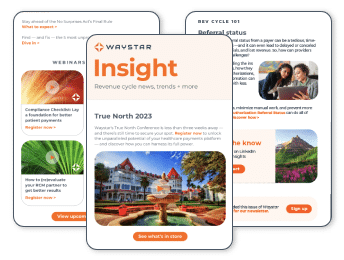A recent industry survey found that a disconnect between the perceived value of digital revenue cycle management tools powered by AI and robotic process automation (RPA) is a barrier when adopting such emerging tech. Still, about half of leading health systems report they plan to invest in such revenue cycle management tools within the next three years to improve financial performance.
The survey findings were recently released by Waystar and The Health Management Academy, which works with leading health systems and industry partners to identify barriers and opportunities in the sector, representing 150 of the largest health systems in the industry.
Hospitals that use the technology value it
Currently, up to 40% of those surveyed report using AI and RPA for frontend, mid-cycle, or backend rev cycle management. Of these, 82% said they adopted the tools to improve financial performance. This was followed by cost reductions related to workforce inefficiencies (79%) and increased revenue capture (62%). A slight disconnect was found in motivating factors and actual results. Ninety-one percent reported improved revenue performance, 82% cited workforce cost reductions, and 74% said that increased revenue capture had resulted.
Overall, health systems currently using AI and RPA report higher satisfaction with revenue cycle management processes than those that are not using or only considering the rollout of such tools.
Growing C-suite support
Survey participants included revenue cycle VPs (34%), IT executives (20%), CFOs (14%), VPs of finance (6%), and others (26%). According to respondents, there are several key takeaways concerning the wider adoption of AI and RPA. These include:
1: Finance and IT executives lead the charge for AI/RPA deployment, but CEOs as primary decision makers have some hesitation. For AI and RPA adoption, CEOs benefit from insight into the capabilities and limitations of such tech. Such progress requires ‘myth-busting’ about common misconceptions. Concerns center around the accuracy of AI and RPA applications and, to a lesser extent, data security. Researchers suggest outside experts are a good source for C-suite education.
2: A growing number of health systems recognize big-picture benefits in adopting AI and RPA. Respondents cite support for value-based care (32%) and the competitive advantage (24%) when adopting a technology platform.
3: Some 94% of leaders are optimistic (40%) or somewhat optimistic (54%) about AI solutions for their organization. This can be attributed to the growing body of evidence that many revenue cycle components are repetitive and can be automated. AI and RPA powered tools free up some or even all of the workforce to do higher-level work while reducing errors.
What health systems can do to prepare for AI + RPA
The survey also reveals that hospitals can take steps to maximize the potential benefits of adopting AI or RPA powered technology. Such prep can shorten the ROI payback period. These factors include:
1: Upskilling the workforce
Staff needs training to transition from repetitive tasks to higher functioning work. According to the report: “…automation can enable staff to cover more accounts, reduce preventable denials and work and appeal a larger percentage of all denials, therefore, increasing reimbursement and reducing costs associated with the process…organizations need to invest in training to support the transition and ensure staff can optimize the use of automation and AI.”
2: Changes to the workflow
Even with no AI and RPA, rules and processes still govern the revenue cycle workflow. Health systems need to review their operating protocols to avoid transferring bad practices. The report cited industry data that 71% of organizations still reconcile point-of-service cash and checks manually. Alternative procedures must be initiated to ensure the switch is successful.
3: Ample data to support AI
It takes the right data flow to take full advantage of an AI and RPA powered platform. A support vendor must ensure that EMR data, for example, is appropriately integrated to glean insights and improve processes and outcomes.
There’s a reason that leading health systems that have adopted AI and RPA powered platforms report higher satisfaction with their revenue cycle. AI and RPA are vital, emerging tools in modern hospital revenue cycle operations — and the data that backs that claim up is only steadily growing.
Find this post helpful? Check out how AI is reshaping prior authorization.


